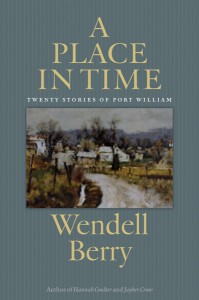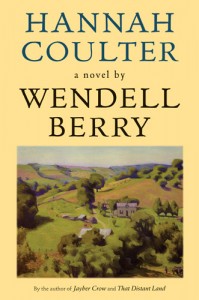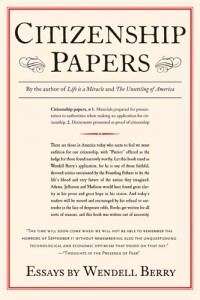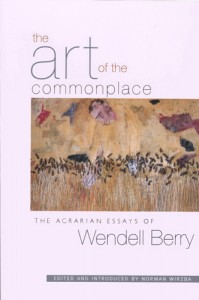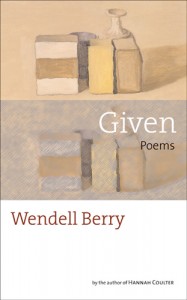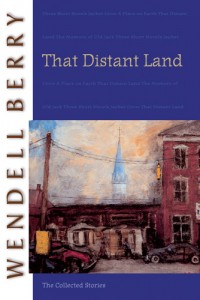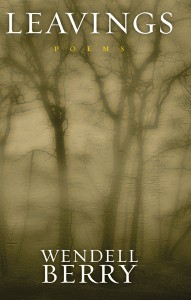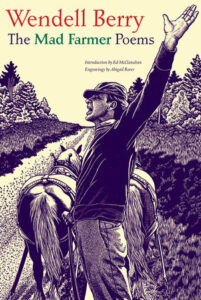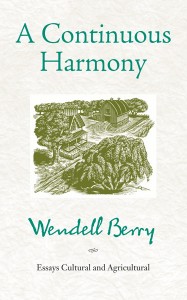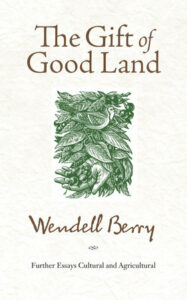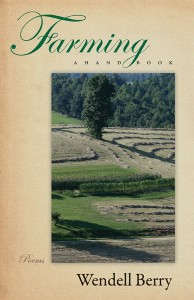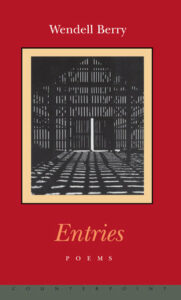Wendell Berry
Wendell Berry is the author of fifty books of poetry, fiction, and essays. He was recently awarded the Cleanth Brooks Medal for Lifetime Achievement by the Fellowship of Southern Writers and the Louis Bromfield Society Award. For over forty years he has lived and farmed with his wife, Tanya, in Kentucky.
Subscribe to our newsletter for news & events from Counterpoint Press.
Books
A Place in Time
Twenty Stories of the Port William Membership
The story of the community of Port William is one of the great works in American literature. This collection, the tenth volume in the series, is the perfect occasion to celebrate Berry’s huge achievement. It feels as if the entire membership—all the Catletts, Burley Coulter, Elton Penn, the Rowanberrys, Laura Milby, the preacher’s wife, Kate Helen Branch, Andy’s dog, Mike—nearly everyone returns with a story or two, to fill in the gaps in this long tale. Those just now joining the Membership will be charmed. Those who’ve attended before will be enriched.For more than fifty years, Wendell Berry has been telling us stories about Port William, a mythical town on the banks of the Kentucky River, populated over the years by a cast of unforgettable characters living in a single place over a long time. In A Place in Time, the stories dates range from 1864, when Rebecca Dawe finds herself in her own reflection at the end of the Civil War, to one from 1991 when Grover Gibbs' widow, Beulah, attends the auction as her home place is offered for sale.
"And so it's all gone. A new time has come. Various ones of the old time keep faith and stop by to see me, Coulter and Wilma and a few others. But the one I wait to see is Althie. Seems like my whole life now is lived under the feeling of her hand touching me that day of the sale, and every day still.
I lie awake in the night, and I can see it all in my mind, the old place, the house, all the things I took care of so long. I thought I might miss it, but I don't. The time has gone when I could do more than worry about it, and I declare it's a load off my mind. But the thoughts, still, are a kind of company."— Beulah Gibbs
Hannah Coulter
A Novel
Hannah Coulter is Wendell Berry’s seventh novel and his first to employ the voice of a woman character in its telling. Hannah, the now–elderly narrator, recounts the love she has for the land and for her community. She remembers each of her two husbands, and all places and community connections threatened by twentieth–century technologies. At risk is the whole culture of family farming, hope redeemed when her wayward and once lost grandson, Virgil, returns to his rural home place to work the farm.Citizenship Papers
Essays
"[Berry's] refusal to abandon the local for the global, to sacrifice neighborliness, community integrity, and economic diversity for access to Walmart, has never seemed more appealing, nor his questions of personal accountability more powerful."—Kirkus ReviewsThere are those in America today who seem to feel we must audition for our citizenship, with "patriot" offered as the badge for those found narrowly worthy. Let this book stand as Wendell Berry's application, for he is one of those faithful, devoted critics envisioned by the Founding Fathers to be the life's blood and very future of the nation they imagined.
Citizenship Papers collects nineteen new essays, from celebrations of exemplary lives to critiques of American life, including "A Citizen's Response [to the new National Security Strategy]"—a ringing call of caution to a nation standing on the brink of global catastrophe.
"The courage of a book, it has been said, is that it looks away from nothing. Here is a brave book." —The Charlotte Observer
"Berry says that these recent essays mostly say again what he has said before. His faithful readers may think he hasn't, however, said any of it better before."—Booklist (starred review)
The Art of the Commonplace
The Agrarian Essays of Wendell Berry
"Here is a human being speaking with calm and sanity out of the wilderness. We would do well to hear him." —The Washington Post Book WorldThe Art of the Commonplace gathers twenty essays by Wendell Berry that offer an agrarian alternative to our dominant urban culture. Grouped around five themes—an agrarian critique of culture, agrarian fundamentals, agrarian economics, agrarian religion, and geobiography—these essays promote a clearly defined and compelling vision important to all people dissatisfied with the stress, anxiety, disease, and destructiveness of contemporary American culture.
Why is agriculture becoming culturally irrelevant, and at what cost? What are the forces of social disintegration and how might they be reversed? How might men and women live together in ways that benefit both? And, how does the corporate takeover of social institutions and economic practices contribute to the destruction of human and natural environments?
Through his staunch support of local economies, his defense of farming communities, and his call for family integrity, Berry emerges as the champion of responsibilities and priorities that serve the health, vitality and happiness of the whole community of creation.
Given
Poems
For five decades Wendell Berry has been a poet of great clarity and purpose. He is an award–winning writer whose imagination is grounded by the pastures of his chosen place and the rooms and porches of his family's home. In Given, the work is as rich and varied as ever before. With his unmistakable voice as the constant, he dexterously maneuvers through a variety of forms and themes—political cautions, love poems, a play in verse, and a long series of Sabbath Poems that resulted from Berry's recent Sunday morning walks of meditation and observation.Berry's work is one of devotion to family and community, to the earth and her creatures, to the memories of the past, and the hope of the future. His writing stands alongside the work of William Carlos Williams and Robert Frost as a rigorous American testament.
That Distant Land
The Collected Stories
Originally published in 2005, That Distant Land brings together twenty–three stories from the Port William Membership. Arranged in their fictional chronology, the book is not an anthology so much as it is a coherent temporal mapping of this landscape over time, revealing Berry’s mastery of decades of the life lived alongside this clutch of interrelated characters bound by affection and followed over generations.This volume combines the stories found in The Wild Birds (1985), Fidelity (1992), and Watch with Me (1994), together with a map and a charting of the complex and interlocking genealogies.
Leavings
Poems
A stunning collection of poems and other writings on love, nature, spirituality, and hope—from the award-winning Kentucky writer who “returned American poetry to a Wordsworthian clarity of purpose” (New York Times Book Review)No one writes like Wendell Berry. Whether essay, novel, story, or poem, his inimitable voice rings true, as natural as the land he has farmed in Kentucky for over forty years.
Following the widely praised Given, this new collection offers a masterful blend of epigrams, elegies, lyrics, and letters, with the occasional short love poem. Alternately amused, outraged, and resigned, Berry’s welcome voice is the constant in this varied mix. The book concludes with a new sequence of Sabbath poems, works that have spawned from Berry’s Sunday morning walks of meditation and observation.
Berry’s themes are reflections of his life: friends, family, the farm, the nature around us as well as within. He speaks strongly for himself and sometimes for the lost heart of the country. As he has borne witness to the world for eight decades, what he offers us now in this collection of poems is of incomparable value.
The Mad Farmer Poems
During the otherwise quiet course of his life as a poet, Wendell Berry has become “mad” at what contemporary society has made of its land, its communities, and its past. This anger reaches its peak in the poems of the Mad Farmer, an open–ended sequence he's found himself impelled to continue against his better instincts. These poems can take the shape of manifestos, meditations, insults, Whitmanic fits and ravings—these are often funny in spite of themselves. The Mad Farmer is a character as necessary, perhaps, as he is regrettable.Here are gathered the individual poems from Berry's various collections to offer the teachings of this amazing American voice. After the great success of the lovely Window Poems, Bob Baris of the Press on Scroll Road returns to design and produce an edition illustrated with etchings by Abigail Rover. James Baker Hall and William Kloefkorn offer poems here that also show how the Mad Farmer has escaped into the work of others. The whole is a wonderful testimony to the power of anger and humor to bring even the most terrible consequences into a focus otherwise impossible to obtain.
A Continuous Harmony
Essays Cultural and Agricultural
"This book is broad and leisurely and important. Something like the river itself on which Wendell Berry lives. It is full of wide and flowing thoughts and one thing leads to another in the manner that nature intended―or used to. The language ranges from the grave and beautiful to the sharp and specific, depending on the need to express the vast variety of subjects he presents."—The NationThe title of this book is taken from an account by Thomas F. Hornbein on his travels in the Himalayas. ""It seemed to me,"" Horenbein wrote, ""that here man lived in continuous harmony with the land, as much as briefly a part of it as all its other occupants."" Wendell Berry's second collection of essays, A Continuous Harmony was first published in 1972, and includes the seminal ""Think Little,"" which was printed in The Last Whole Earth Catalogue and reprinted around the globe, and the splendid centerpiece, ""Discipline and Hope,"" an insightful and articulate essay making a case for what he calls ""a new middle."
The Gift of Good Land
Further Essays Cultural and Agricultural
The essays in The Gift of Good Land are as true today as when they were first published in 1981; the problems addressed here are still true and the solutions no nearer to hand. The insistent theme of this book is the interdependence, the wholeness, the oneness of people, land, weather, animals, and family. To touch one is to tamper with them all. We live in one functioning organism whose separate parts are artificially isolated by our culture. Here, Berry develops the compelling argument that the “gift” of good land has strings attached. We have it only on loan and only for as long as we practice good stewardship.Farming
A Hand Book
The sanity and eloquence of these poems spring from the land in Kentucky where Wendell Berry was born, married, lives, farms, and writes. From classic pastoral themes both lyrical and reflective, to a verse play, to a dramatic narrative and the manic, entertaining, prescient ravings of Berry’s Mad Farmer, these poems show a unity of language and consciousness, skill and sensitivity, that has placed Wendell Berry at the front rank of contemporary American poets.Entries
In these poems, Wendell Berry combines plainspoken elegance with deeply felt emotion—this is work of both remembrance and regeneration. Whether writing as son of a dying father or as father of a daughter about to be wed, Berry plumbs the complexities of conflict, grief, loss, and love. He celebrates life from the domestic to the eternal, finding in the everyday that which is everlasting.
Catapult | Counterpoint | Soft Skull
1140 Broadway #706
New York, NY 10001
646.926.0805 | info@counterpointpress.com





